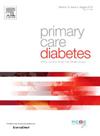Proactive total diet replacement referral for type 2 diabetes: A service evaluation
IF 2.6
4区 医学
Q3 ENDOCRINOLOGY & METABOLISM
引用次数: 0
Abstract
Aims
Type 2 Diabetes Mellitus morbidity disproportionally effects the most socioeconomically deprived 20 % of England. Total Diet Replacement (TDR) is a high impact intervention currently commissioned by Integrated Care Boards (ICB). Finding and referring eligible, motivated patients is a significant challenge. This study evaluates a 12-month population health management, proactive referral intervention commissioned by Nottingham and Nottinghamshire ICB during a 2-year TDR pilot designed to supplement referrals from primary care.
Methods
A Diabetes specialist nurse clinically reviewed a list of potentially eligible patients found by searching routinely collected health care data from 16 primary care centres in 3 PCNs.
Results
19.7 % (50/254) of potential patients were referred during the intervention period. 19.3 % (49/254) were uncontactable. 39.8 % (101/254) declined referral. 17.7 % (45/254) were ineligible after clinical review. An interrupted time series analysis suggests monthly referrals increased during the study period due to the intervetion (F (1,22) = 5.19 p=0.0345). Searching for patients from more socioeconomically deprived areas (index of multiple deprivation deciles 1–3) did not meaningfully alter the referral yield (19.6 %, 19/97).
Conclusions
Proactive care interventions could be used to facilitate referrals to the TDR or other high impact interventions by healthcare commissioning bodies.
2 型糖尿病患者的主动全饮食替代转诊:服务评估。
目的:2 型糖尿病的发病率对英格兰社会经济最贫困的 20% 人口的影响尤为严重。全饮食替换(TDR)是目前由综合护理委员会(ICB)委托进行的一项高效干预措施。寻找和转诊符合条件、有积极性的患者是一项重大挑战。本研究评估了诺丁汉和诺丁汉郡综合医疗委员会在为期 2 年的全饮食替代试点期间委托开展的一项为期 12 个月的人口健康管理、主动转诊干预措施,该措施旨在补充来自初级保健的转诊:方法:一名糖尿病专科护士通过搜索 3 个 PCN 中 16 个初级保健中心的常规保健数据,对可能符合条件的患者名单进行临床审查:在干预期间,19.7%(50/254)的潜在患者被转诊。19.3%(49/254)的患者无法联系。39.8%的患者(101/254)拒绝转诊。17.7%(45/254)经临床审查不符合条件。间断时间序列分析表明,在研究期间,每月转诊人数因间断时间序列而增加(F (1,22) = 5.19 p=0.0345)。对来自社会经济较贫困地区(多重贫困指数1-3分位)的患者进行搜索并未显著改变转诊率(19.6%,19/97):结论:积极的护理干预措施可用于促进转诊至TDR或医疗委托机构的其他高效干预措施。
本文章由计算机程序翻译,如有差异,请以英文原文为准。
求助全文
约1分钟内获得全文
求助全文
来源期刊

Primary Care Diabetes
ENDOCRINOLOGY & METABOLISM-PRIMARY HEALTH CARE
CiteScore
5.00
自引率
3.40%
发文量
134
审稿时长
47 days
期刊介绍:
The journal publishes original research articles and high quality reviews in the fields of clinical care, diabetes education, nutrition, health services, psychosocial research and epidemiology and other areas as far as is relevant for diabetology in a primary-care setting. The purpose of the journal is to encourage interdisciplinary research and discussion between all those who are involved in primary diabetes care on an international level. The Journal also publishes news and articles concerning the policies and activities of Primary Care Diabetes Europe and reflects the society''s aim of improving the care for people with diabetes mellitus within the primary-care setting.
 求助内容:
求助内容: 应助结果提醒方式:
应助结果提醒方式:


